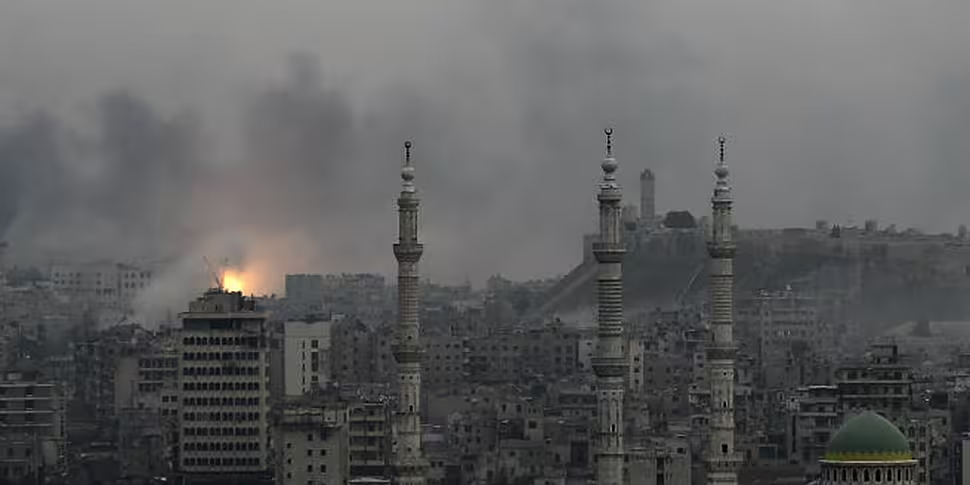As Syrian government forces come close to fully recapturing the rebel-held area of the city of Aleppo, it has become clear there is a major humanitarian crisis in the city.
The battle for the city - known before the war for its ancient markets and exquisite mosques - is nearing its end, but we may never know the full human costs of the four-year long crisis.
Yesterday, the UN Human Rights Office said it has received 'credible reports' of scores of civilians being killed in eastern Aleppo – either by intense bombardment or summary execution.
"Dozens of bodies reportedly litter the streets of a number of east Aleppo neighbourhoods, with residents unable to retrieve them due to the intense bombardment and fear of being shot," the office said in a statement.
"Multiple sources have reported that pro-Government forces killed at least 82 civilians, including 11 women and 13 children, in the Bustan al-Qasr, al-Ferdous, al-Kallaseh, and al-Saleheen neighbourhoods yesterday. Thousands of people who remain in areas under the control of armed groups are at risk of grave violations, including detentions, torture and killings."
That the UN itself is working off reports and sources highlights one of the major difficulties with reporting on the situation in Aleppo - the lack of access, and the fact that few journalists, aid workers or activists remain on the ground. Those who do remain find themselves in a seemingly increasingly dangerous position.
Meanwhile, the different groups involved in the battle have offered up their own often conflicting descriptions of events, making it difficult to get an accurate picture of the situation on the ground. Social media images and haunting images of destroyed & abandoned neighbourhoods are often all we have to give us some idea of the scale of the situation in the besieged city.
Earlier today, both rebel and regime forces blamed each other for breaking a ceasefire. The renewed fighting led to the delay of a planned evacuation of civilians - prolonging an already challenging situation.
How are aid agencies and medical workers responding to the crisis in the city?
Russian soldiers check a burned medical tent after rebels launched a mortar shell at a field hospital in west Aleppo, Syria. Picture by Hassan Ammar AP/Press Association Images
"This is just too much to ask of people"
Niall O’Keeffe is the head of Trócaire’s programmes in the Middle East, and spoke to Newstalk.com earlier today. The charity's programme in Syria predominantly involves working with local partner agencies to support the humanitarian responses.
One of those partner organisations has centres and staff in Aleppo. Niall, who spoke to members of the organisation yesterday, described the situation those on the ground in east Aleppo are facing.
"Since last Friday they have closed their centre because of all the bombardment that has taken place," he explained. "In the last couple of days some of the staff are still in the centre, and they have witnessed people who have been killed in the streets.
"One of the staff members of this organisation was also killed yesterday morning by the shelling that was taking place. The organisation and other staff members at this point are very distraught."
He pointed out that the group in Aleppo knew of 11 people who had been killed during the day, including its staff member. But even those on the ground are relying on public information from the likes of the UN for an idea of what is happening beyond what they have witnessed themselves.

Smoke rises in an east Aleppo neighborhood as the sun rises during a battle between forces loyal to Syrian President Bashar Assad and rebels in Aleppo. Picture by Hassan Ammar AP/Press Association Images
"At this stage, organisations are saying we can't provide sufficient amounts of protection for staff when [people are] being killed," he suggested. "This is just too much to ask of people - to put their lives at risk to this extent."
Similarly catastrophic situations have been described by people working with other aid agencies in the region.
In a statement yesterday, Teresa Sancristoval - the head of Médecins Sans Frontières (MSF) Emergency Unit for Aleppo - said: “This is one of the worst crises that MSF has witnessed in years. We remind all sides that even war has rules.
"It is paramount that all parties allow people to flee to safety, allow the evacuation of sick and wounded, and facilitate the provision of protection and humanitarian assistance to those that are caught on the frontlines," she added.
The Syria Civil Defence - known as the White Helmets - has also been sharing updates:
+100,000 civilians are packed into a tiny area. Bombing + shelling relentless. Casualties unimaginable. Bodies lie where they fell.
— The White Helmets (@SyriaCivilDef) December 13, 2016
Message from @ishmael12345611 SCD volunteer from inside besieged city of Aleppo.#save_Aleppo pic.twitter.com/hrfbfUcvB4
— The White Helmets (@SyriaCivilDef) December 14, 2016
Other videos shared from within the city have captured the intense scenes being faced by those who remain in Aleppo.
Pounding the east of #Aleppo with dozens of artillery bombs since one hour until now we have counted more than 100 bombs.#Stand4Aleppo pic.twitter.com/1EG68WdpQV
— Zouhir_AlShimale (@ZouhirAlShimale) December 14, 2016
Niall O'Keeffe observed: "I've worked in the humanitarian sector for the last 20 years. I worked after the Rwanda genocide, in the refugee camps. This is one of the catastrophes which is just playing out in front of our eyes. It is there in full media view.
"We've never had so much social media, so much video footage, so much audio. Nobody can say in the international community that we don't know what is happening. At this stage we need to do something - Ireland needs to be doing something, Europe needs to be doing something, Russia and the US need to be doing something to literally put a stop to this carnage which is happening," he concluded.










